My wife and I took a 35-hour train ride from Los Angeles to Seattle. These were the 5 best and 5 worst parts of the trip.
Anya Crittenton

- Over the course of 4 days, my wife and I rode a train up and down the West Coast for over 70 hours.
- The Amtrak ride was relaxing and enjoyable and had great views.
At the end of July, my wife and I took a train to Seattle for a college friend's wedding.
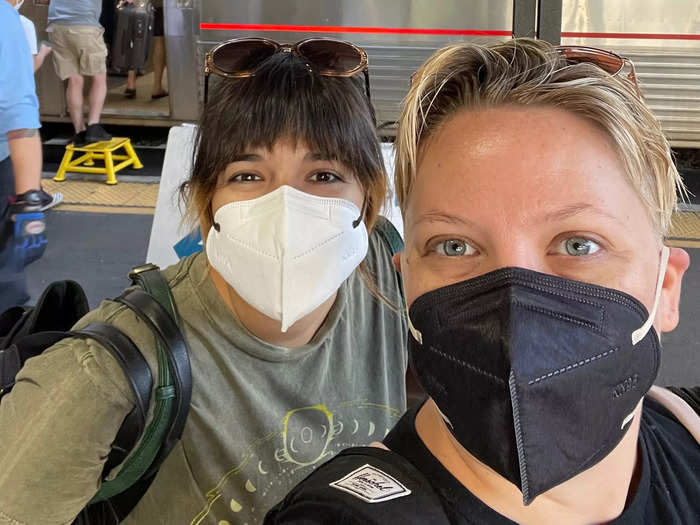
Instead of paying at least $600 per person for a roundtrip flight from Los Angeles to Seattle, we opted to ride Amtrak's Coast Starlight.
The double-decker train travels to and from Los Angeles and Seattle, and the journey is about 35 hours each way. This meant that, of our six-day trip, only two days were actually spent in Seattle.
We paid $504 round trip for our reserved coach seats because if we couldn't afford over $1,000 worth of plane tickets to get to Seattle in only a few hours, we definitely couldn't afford to sleep horizontally.
I am, admittedly, a train lover. I was excited for this trip, and although it mostly lived up to its reputation as one of the most beautiful and enjoyable train rides in the US, it also had its downsides.
Here are five highlights and lowlights from the Coast Starlight.
BEST: Amtrak's generous baggage policy
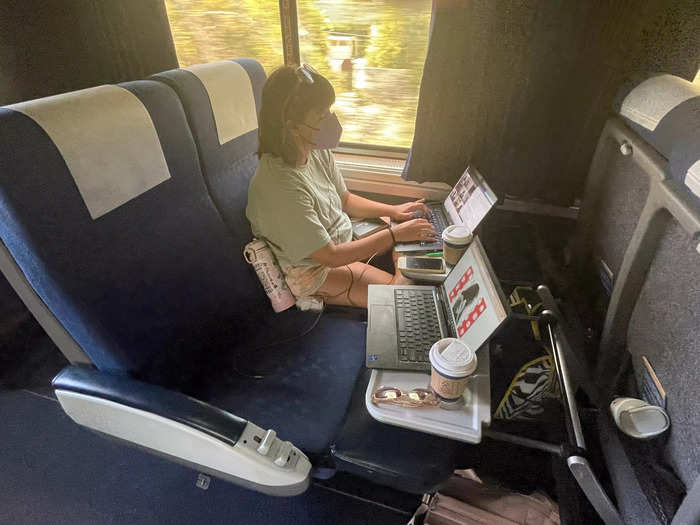
Unlike with flying, the baggage restrictions were pretty loose and we didn't have to pay extra to store a bag or bring more than one.
On the Coast Starlight, each passenger was allowed to bring up to two bags (50 pounds each) and two carry-ons (25 pounds each). On our particular trip, no one checked or weighed our bags, so the above restrictions were not actually enforced.
Despite the generous policy, there were only two of us, and lugging eight bags would've been a lot. We packed five bags total – three we kept with us for laptops, reading materials, headphones, food, etc., and two we stored on the first floor of the train, which you can access at any time.
One of our stored bags contained everything for Seattle and the other contained our "sleeping supplies" — earplugs, eye masks, slipper socks, a blanket, small pillows, and a change of clothes.
WORST: The train's old and not-so-clean bathrooms
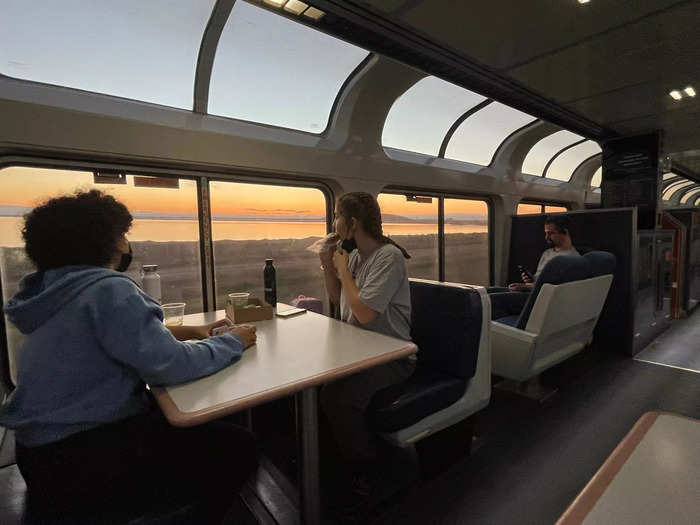
We took numbers 11 and 14 of the Coast Starlight trains – and they were a few decades old. In my opinion, a makeover would not be a bad idea for these trains.
Although most of the train was clean and comfortable (especially, and most, fortunately, our seats), the bathrooms were another story.
Located on the first floor of each car near the baggage storage, there are small, airplane-like bathrooms and one changing room with an attached bathroom. We peed and changed in the bathrooms as quickly as possible, not wanting to stay any longer than necessary.
BEST: The observation car and its stunning views
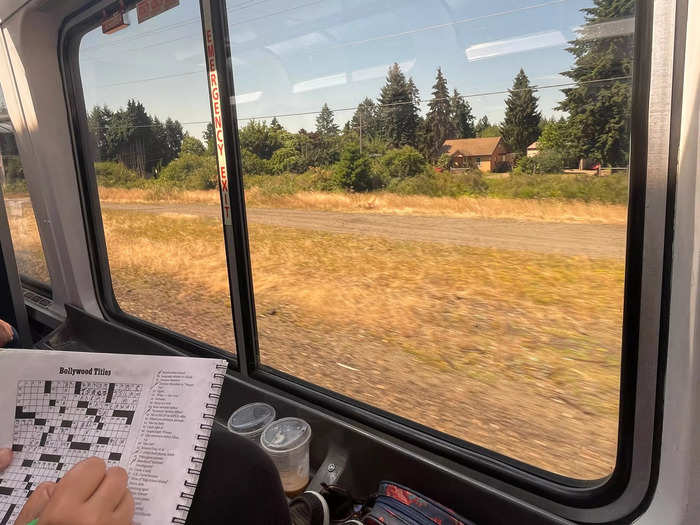
One place on the train we never wanted to leave, however, was the observation car. This car consists of two important levels – the cafe on the first floor and the observation deck on the second.
The observation deck is, by far, the best feature of the Coast Starlight. It is an experience like no other.
In this section, you can seat yourself at a booth with a table, or chairs facing the massive windows that stretch from the floor all the way up, curving into the ceiling.
Some of the most breathtaking views of this ride included the California coast, where you're so close to the ocean you feel like you can taste the salty sea air, and the Oregon mountains and lakes.
Grab a glass of wine and a book, and it becomes truly incandescent.
WORST: Coach doesn't get to access to the dining car
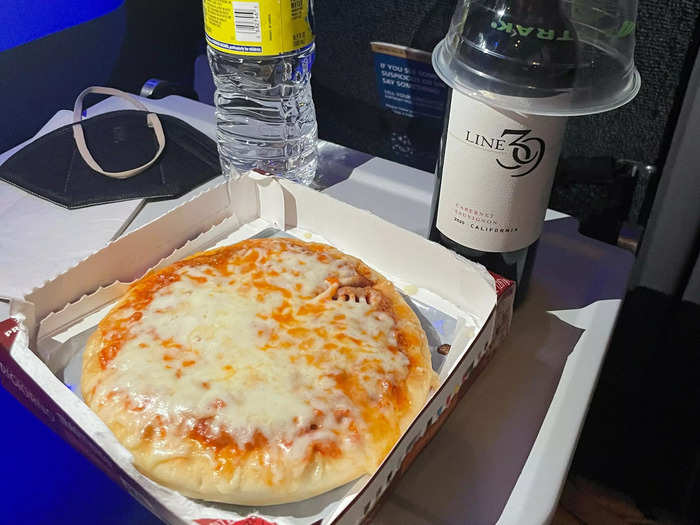
At the cafe, anyone can purchase snacks, microwaved meals, and – mostly important – reasonably priced alcohol. I saw a a 375-milliliter bottle of wine for $16.
The food was fine. There are options like mac and cheese, cheese pizza, a vegetarian tamale, and a plain bagel with cream cheese.
It's nothing like the food quality and service of the dining car, which is only available to those in sleeper cars and business class. There, you can enjoy grilled Atlantic salmon and a cocktail.
Though a problem of any major transportation company, this disparity in quality depending on your wealth or lack thereof, definitely soured some of the experience.
Fortunately, the aforementioned generous baggage policy includes allowing passengers to bring their own food and drink. Both ways, my wife and I packed cold meals requiring no heating, snacks, and drinks. We bought food and drink from the cafe car a few times, but not nearly as much as we could have. This helped us save a bit of money.
A representative for Amtrak told Insider that traditional and flexible dining "have been positioned as an exclusive and complimentary service for our customers in private rooms—with the goal of providing an elevated, first class experience for these high-paying customers."
They also said Amtrak has plans to refresh its "cafe menus on long distance routes" with new, fresh items next month.
BEST: You can truly sit back and relax
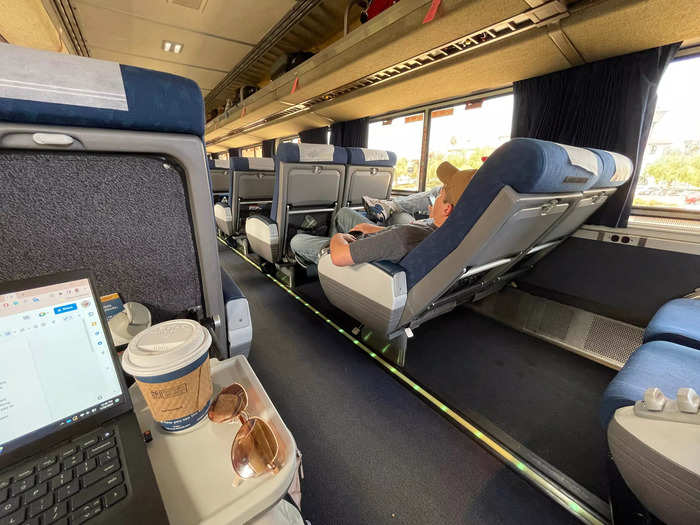
My wife and I considered getting to Seattle via road trip at first. As Angelenos, it's almost second nature to us to be in the car.
Perhaps that's why it didn't appeal to me as much, or it's because my wife, the long-distance driver, would have to do most of the labor as driving long, monotonous stretches makes me tired.
On the Coast Starlight, however, you get to sit back and relax.
We downloaded TV episodes onto our iPad (and finally started Apple TV+'s "Loot") and podcasts onto our phones. We also packed books in our bags.
Let me tell you – reading Sappho while high on a train is a life-changing experience.
Throughout over 70 hours on the train, we stared out the window, took naps, and let ourselves indulge and go slow. We didn't stress about the little things. It was a surreal and much-needed change of pace for a few days.
WORST: It's hard to sleep at a a 45-degree angle
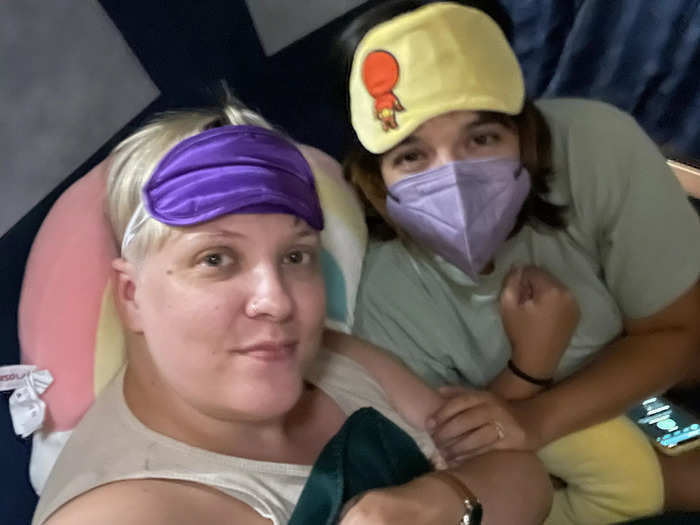
When you're awake, coach seats on the Coast Starlight are rather comfortable. The seats themselves are like armchairs — they recline back further than airplane seats and have a leg rest you can pop up to stretch out.
In the evenings, once we'd brushed our teeth, changed into slipper socks, and grabbed our blanket, it was easy to get cozy and watch TV as the train bounded on.
Sleeping is a different story. It's possible and still, again, better than sleeping on a plane in economy, but it's not comfortable.
We contorted ourselves into pretzels, tucking our knees into the spaces of the other until we finally dozed off. Earplugs and eye masks seemed absolutely necessary, given the train stops, letting people on and off, throughout the entire night.
On the way to Seattle, I slept so poorly that I almost used Amtrak's BidUp service. With this, you can "bid" for better seats on your upcoming ride, including upgrading to business or sleeper. If you win, you'll be charged your bid amount and your ticket will be upgraded.
Ultimately, though, I decided it wasn't worth the money.
BEST: You can meet new people and also have privacy
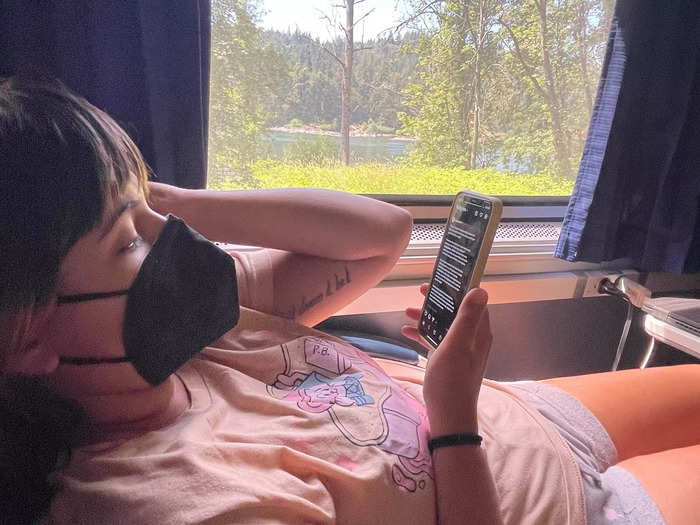
Trains are great because they welcome extroverts and introverts. It's easy to meet people in the common spaces of the train.
On our first day, we went down to the cafe to get coffee and met a woman taking her mother, who has cancer, to see Journey in concert. Near our seats on the way up, we met a family from Kentucky – their twin boys had just celebrated their 18th birthdays and their present was this West Coast adventure.
Privacy, however, is also easy. There are only two seats per row, meaning no awkward third like on many planes. Whenever my wife and I were at our seats, we were never bothered and were always free to simply cocoon in our little train haven.
WORST: There was no Wi-Fi available, not even to purchase
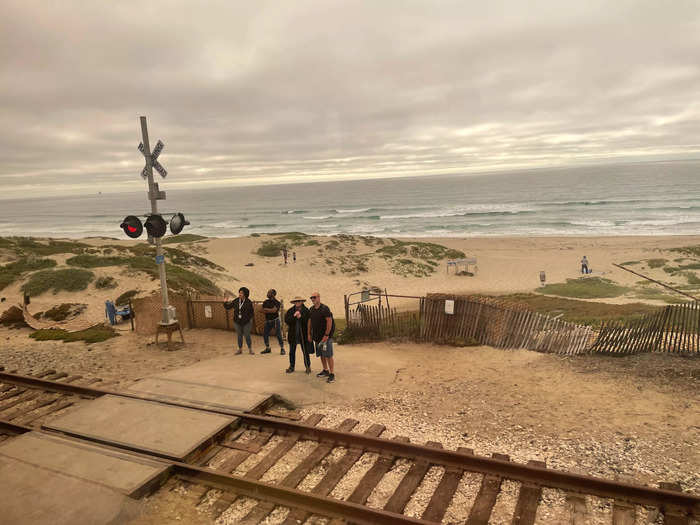
Listen, I hear you. There's no Wi-Fi on planes either — at least, not for free. On the Coast Starlight, however, you can't even buy Wi-Fi.
For the most part, this wasn't a problem. It was nice to step away from all the notifications and distractions the world brings us every moment of every day on our screens. Plus my wife and I prepared by downloading media beforehand and packing books.
But we also decided to use this trip as a working vacation and it was frustrating at times when our mobile hotspots dipped in and out, or our download of the newest episode of "The Challenge: USA" suddenly crashed.
BEST: The Trails & Rails service was informative
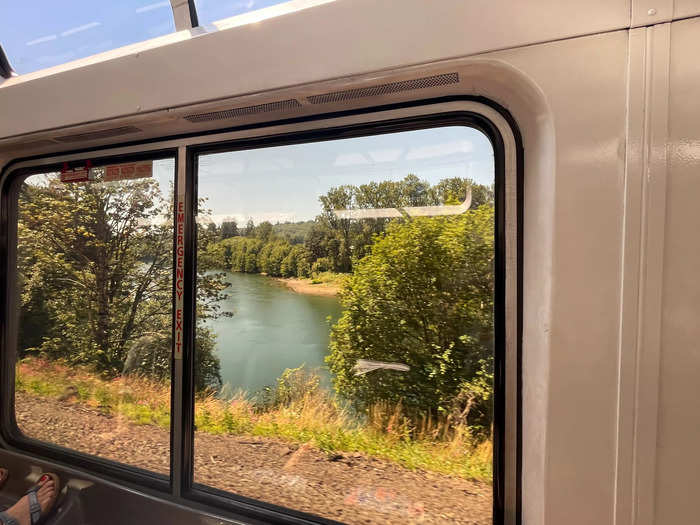
One of the best legs of the Coast Starlight journey is Washington — not only for the green scenery, but also for the presence of the National Park Service.
Operating for over two decades, Trails & Rails is a service of the National Parks where volunteers "share stories about national, state and local parks as well as places of interest" along the route.
Washington's Klondike National Park supplies volunteers to share information and answer any questions you may have.
Our volunteer on the route home was Simon, who told us the volunteers read a big book full of information before embarking and have to "thread the needle" between historical facts and family-friendly information. (For context, many stories in Washington center on Indigenous tribes and their stolen history.)
WORST: Travel delays are always unfortunate
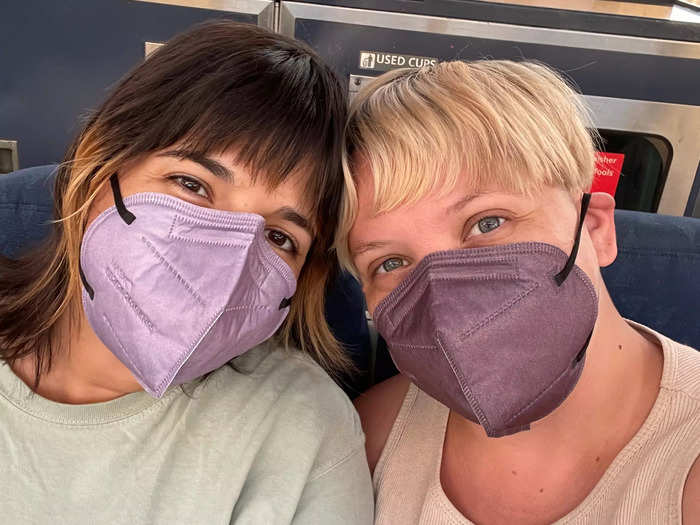
On our way back to LA, we were maybe 45 minutes from our stop when the train came to a halt in Oxnard, California. It wasn't a station — we were simply stopped on the tracks. The conductor announced via speaker about 20 or 30 minutes into this stop that, because of police activity ahead, we had to wait.
There was no way of knowing how long it would be and it pushed our journey well over 70 hours on a train. At that point, as much as I had been enjoying myself, I wanted so badly to get off.
Delays can happen with any travel, but being confined to the train during the delay definitely became stifling and tight for me.
Fortunately, our mobile hotspot was working and we were able to livestream that night's episode of "The Bachelorette" since we were supposed to be home by 8 pm. Instead, we returned home closer to 10 pm.
Popular Right Now
Popular Keywords
Advertisement